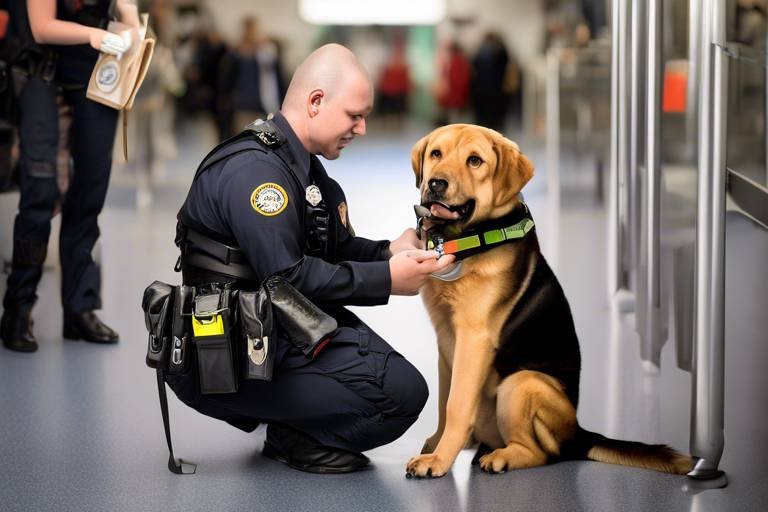Understanding the Impact of Pet Ownership on Behavior
Have you ever wondered how owning a pet can transform your life? The bond between humans and animals is profound, and it goes beyond mere companionship. Pet ownership influences our behavior, emotions, and even our mental health in ways that are both surprising and enlightening. From the moment you welcome a furry friend into your home, your life begins to change. It’s like adding a new color to your life’s canvas, one that brings joy, laughter, and sometimes a little chaos. But what exactly does this mean for our daily lives and interactions with others?
Research has shown that pets can serve as a source of unconditional love and support, helping to alleviate feelings of loneliness and isolation. Imagine coming home after a long day, greeted by a wagging tail or a gentle purr. This simple act can elevate your mood and remind you that you are loved. Furthermore, the presence of pets has been linked to lower levels of cortisol, the stress hormone, and higher levels of oxytocin, often referred to as the "love hormone." This chemical cocktail can lead to improved emotional well-being, making pet owners generally happier and more resilient.
But the impact of pet ownership doesn't stop at individual benefits. It ripples outward, influencing social behavior and community dynamics. When you own a pet, especially a dog, you find yourself in situations where you meet fellow pet lovers. Whether it’s at the park, during a walk, or online, pets can act as social catalysts, breaking down barriers and fostering connections among people. This social aspect of pet ownership can be incredibly enriching, creating a sense of belonging that many people crave.
In essence, the act of caring for a pet requires responsibility and commitment, which in turn can shape our behaviors and interactions. The daily routines that come with pet ownership often lead to healthier lifestyles, as owners tend to be more active and engaged with their communities. It's a beautiful cycle where the love for a pet not only enhances our lives but also encourages us to connect with others who share similar passions.
As we dive deeper into the various aspects of pet ownership, we will explore the psychological and physical benefits, the challenges that come with it, and how pets can significantly influence our relationships with family and friends. So, are you ready to discover how this furry companionship can reshape your world?

The Psychological Benefits of Pet Ownership
Owning a pet is like having a little bundle of joy that brings warmth and happiness into your life. The psychological benefits of pet ownership are profound and can transform the way we perceive our daily lives. Imagine coming home after a long, stressful day, and there’s your furry friend, tail wagging, ready to greet you. This simple act can instantly lift your mood and help you forget about your worries. Studies have shown that interacting with pets can lead to a significant decrease in levels of stress and anxiety.
Pets offer emotional support that is often unparalleled. They seem to have an innate ability to sense our feelings. When you’re feeling down, your pet might curl up next to you, providing comfort without judgment. This unconditional love can be especially beneficial for individuals dealing with mental health issues like depression or social anxiety. The simple act of petting a dog or cat has been shown to release oxytocin, a hormone that promotes bonding and reduces stress levels in humans. It’s almost like a natural therapy session that doesn’t come with a hefty price tag!
Furthermore, pets can help establish a routine, which can be incredibly grounding for those struggling with mental health challenges. Having to feed, walk, and care for a pet instills a sense of responsibility and purpose. This routine can provide a structure that many people find comforting. It’s like having a built-in schedule that encourages you to get out of bed and engage with the world. In this way, pets can act as a motivational force, pushing us to be more active and involved in our surroundings.
Interestingly, pet ownership has also been linked to improved self-esteem and social skills. For children, growing up with pets can foster a sense of empathy and compassion as they learn to care for another living being. It teaches them important life lessons about responsibility and nurturing. Adults, too, can benefit from the social aspect of having a pet. Whether it’s chatting with a fellow dog owner at the park or sharing cute pet photos online, pets can be a bridge to building social connections.
In fact, studies have shown that pet owners are generally more satisfied with their lives compared to non-pet owners. The companionship that pets provide can combat feelings of loneliness and isolation. In a world where many people feel disconnected, having a pet can create a sense of belonging and community. It’s amazing to think how a small creature can have such a big impact on our emotional well-being!
To summarize, the psychological benefits of pet ownership are vast and varied. From reducing stress and anxiety to boosting self-esteem and fostering social connections, pets enrich our lives in countless ways. They’re more than just animals; they’re companions that help us navigate the ups and downs of life. So, if you’re considering bringing a pet into your home, know that you’re not just adding a cute face to your life, but also opening the door to a world of emotional support and well-being.

Social Interactions and Community Building
When you think about it, pets are more than just adorable companions; they are social catalysts that can transform the way we interact with others. Whether it's a wagging tail or a gentle purr, pets have this incredible knack for breaking the ice in social situations. Imagine walking your dog in the park and suddenly finding yourself in a conversation with a fellow dog owner. It’s like having a built-in social tool that helps you connect with strangers, fostering friendships that might not have formed otherwise. This phenomenon is not just a coincidence; it's a testament to how pets can enhance our social lives and strengthen community bonds.
One of the most significant ways pets facilitate social interactions is through shared experiences. When you and another pet owner exchange stories about training mishaps or funny quirks of your pets, it creates a sense of camaraderie. You might even find yourself laughing over the same silly antics that only pet owners can appreciate. This shared understanding can lead to deeper connections and a sense of belonging within your community.
Think about the last time you met someone new. Did you talk about the weather or your job? Or did your pet become the focal point of the conversation? Pets, especially dogs, are natural conversation starters. They draw attention and invite questions. “What breed is he?” or “How old is she?” are common inquiries that can lead to longer discussions. This simple act of engaging with a pet can pave the way for friendships, making it easier to connect with others.
Dog parks are like social hubs for pet owners. They provide a relaxed environment where both pets and their humans can mingle. At a dog park, it’s not just about letting your furry friend run free; it's also about the interactions that happen between owners. You can share tips on training, discuss the best local pet services, or even organize playdates. The dynamic in these spaces often leads to spontaneous conversations, creating a vibrant community of pet lovers. These connections can extend beyond the park, leading to friendships that enrich your life.
In today's digital age, online pet communities have emerged as another avenue for social interaction. Platforms like Facebook, Instagram, and dedicated pet forums allow pet owners to connect, share experiences, and seek advice. These online spaces foster a sense of belonging, especially for those who may feel isolated in their everyday lives. Engaging with others who share a passion for pets can lead to meaningful relationships, even if they start in the virtual world. People often share heartwarming stories, seek support during tough times, or celebrate milestones together, creating a tight-knit community.
In conclusion, the social interactions that arise from pet ownership are invaluable. They not only enhance our personal lives but also contribute to building a stronger community. Whether through casual encounters at the park, conversations sparked by our pets, or connections made online, pet ownership opens doors to friendships and social networks that enrich our lives. So, the next time you take your furry friend out, remember that you’re not just walking a pet; you’re also walking into a world of potential connections and community.
- How can pets help reduce social anxiety? Pets can act as a comfort and confidence booster, making it easier for individuals to engage in social situations.
- Are there specific types of pets that encourage more social interactions? Dogs tend to be more social and are often more likely to engage with other people and pets, compared to other animals.
- What are some ways to meet other pet owners? Visiting dog parks, joining pet-related clubs, or participating in online communities are great ways to connect with fellow pet owners.
Pets as Conversation Starters
Have you ever noticed how a cute dog or an adorable cat can instantly lighten the mood in a room? Pets are not just companions; they are powerful tools for breaking the ice in social situations. Imagine walking into a park, and there it is—a fluffy Golden Retriever wagging its tail, ready to greet everyone. Suddenly, the atmosphere shifts. People smile, laughter bubbles up, and conversations ignite. It's as if the pet has a magical ability to dissolve barriers between strangers.
When you own a pet, you have an automatic topic of conversation. Whether it's sharing funny stories about your pet's antics or discussing their favorite toys, pets provide a natural segue into deeper discussions. Have you ever been in a situation where you struggled to find common ground with someone? With a pet around, you can easily ask, "What kind of dog do you have?" or "Is your cat as quirky as mine?" These questions are not just small talk; they pave the way for genuine connections.
Moreover, pets can help people bond over shared experiences. For instance, if you and another pet owner find yourselves at the dog park, you might exchange tips on training or even discuss your pets' health. This shared knowledge can lead to friendships that extend beyond the park. In fact, many pet owners have formed lasting relationships simply by sharing their love for their furry friends.
Interestingly, pets also serve as a bridge across different demographics. They can connect people of all ages, backgrounds, and lifestyles. A young professional can strike up a conversation with a retiree, all thanks to their mutual affection for dogs. This unique ability of pets to unite diverse groups can foster a sense of community, making everyone feel included and valued.
In today’s digital age, pets are also taking conversations online. Social media platforms are flooded with pet-related content, from heartwarming stories to hilarious videos. These posts often spark discussions among followers, creating an online community where pet lovers can connect. Many people have turned their love for their pets into blogs or social media accounts, further expanding their social circles and creating friendships that might never have happened otherwise.
In conclusion, pets are much more than just animals; they are social catalysts. They invite interaction, create bonds, and foster a sense of belonging. So, the next time you find yourself feeling shy or reserved in a social setting, remember that your pet is your best wingman. With them by your side, striking up a conversation might just be a wag of the tail away!
- How do pets help with social anxiety? Pets can ease social anxiety by providing comfort and a natural topic for conversation, making it easier to engage with others.
- Can pets improve my dating life? Absolutely! Pets can be great conversation starters and can make you more approachable.
- What are some tips for introducing pets in social settings? Start by allowing your pet to interact with others, and use their presence to initiate conversations about shared interests.
Dog Parks and Socialization
Dog parks are like community hubs for pet owners and their furry friends. Imagine stepping into a vibrant space where dogs frolic freely, tails wagging, and owners engage in lively conversations. These parks not only provide a safe environment for dogs to play and socialize, but they also serve as a fantastic platform for humans to connect with one another. It's not just about the dogs having fun; it's about forging new friendships and strengthening community ties.
When you visit a dog park, you might notice how easy it is to strike up a conversation with fellow dog owners. Whether it's discussing your dog's quirky habits or sharing training tips, these interactions can lead to meaningful connections. In fact, many friendships have blossomed in these parks, proving that a shared love for pets can break down barriers and create a sense of belonging.
Moreover, dog parks encourage socialization not just for the dogs but for their owners as well. It's common to see people forming groups based on their dogs' play styles or breeds. This can lead to organized meet-ups, playdates, and even community events centered around pets. The shared experiences of watching dogs play, learning about different breeds, and exchanging stories about pet care all contribute to a rich social tapestry.
However, it's essential to acknowledge that dog parks can also present challenges. Not all dogs get along, and it's crucial for owners to monitor their pets and ensure a safe environment for everyone. Understanding dog behavior and being aware of your surroundings can help prevent conflicts and ensure that the park remains a welcoming space for all. So, while the joy of socialization is a significant benefit, it also comes with the responsibility of being a conscientious pet owner.
In summary, dog parks are more than just places for dogs to run around; they are vibrant social arenas that foster connections among pet owners. They provide opportunities for building friendships, sharing experiences, and enhancing community spirit. So next time you take your dog to the park, remember that you're not just giving them a chance to play; you're also opening the door to new friendships and enriching your social life.
- What should I bring to a dog park? It's essential to bring water for your dog, waste bags for clean-up, and any toys your dog enjoys. Some parks may have amenities like benches or shaded areas, but being prepared is always a good idea.
- Are all dogs suitable for dog parks? Not every dog is a good fit for a dog park. If your dog is aggressive or overly shy, it may be better to seek alternative socialization methods, such as one-on-one playdates.
- How can I ensure my dog behaves well at the park? Training your dog to follow basic commands, such as "sit," "stay," and "come," can help manage their behavior in a social setting. Regular visits can also help your dog become accustomed to the park environment.
- What should I do if a dog is aggressive towards mine? If you encounter an aggressive dog, calmly remove your dog from the situation. It's essential to stay calm and avoid escalating the situation. If necessary, alert the owner of the aggressive dog.
Online Pet Communities
In today's digital age, have blossomed into vibrant spaces where pet lovers can connect, share, and learn from one another. Imagine a virtual park where you don’t just walk your dog but also meet fellow enthusiasts who share your passion for pets. These communities are more than just forums; they are thriving ecosystems filled with advice, support, and camaraderie. Whether you’re a cat person, a dog lover, or even a reptile enthusiast, there’s a corner of the internet just for you!
One of the most exciting aspects of these online communities is the diversity of platforms available. From social media groups on Facebook and Instagram to dedicated websites and forums, the choices are endless. Each platform offers unique features that cater to different needs. For instance, on Facebook, you might find local groups where members share tips on pet care and organize meetups. Meanwhile, Instagram is perfect for those who love visual storytelling, allowing users to showcase their pets' adorable antics through photos and videos.
Moreover, these communities often provide a wealth of information that can help pet owners navigate the ups and downs of pet care. You can find everything from training tips to health advice, all shared by fellow pet owners who have been in your shoes. It’s like having a panel of experts at your fingertips, ready to offer their insights and experiences. Many users post questions about specific issues they’re facing, and the responses can range from practical solutions to emotional support, creating a sense of belonging and understanding.
Another fascinating aspect is the opportunity for collaboration and advocacy. Many online pet communities come together to support animal shelters, rescue organizations, and advocacy campaigns. For example, members might organize fundraising events or awareness campaigns to help animals in need. This not only strengthens the bond among community members but also contributes positively to society, showcasing how a shared love for pets can lead to meaningful change.
However, it’s essential to approach these communities with a discerning eye. While there is a lot of valuable information available, not everything shared online is accurate or safe. It's crucial to verify advice and seek guidance from qualified professionals when it comes to your pet's health and well-being. In this digital landscape, being an informed participant can make all the difference.
In conclusion, online pet communities are a fantastic way for pet owners to connect, share experiences, and grow together. They provide a platform for building relationships, exchanging knowledge, and advocating for animal welfare. So, whether you’re looking for advice, a new friend, or simply a place to share your pet's cuteness, these communities are just a click away!
- What are online pet communities?
Online pet communities are digital platforms where pet owners can connect, share experiences, and seek advice about pet care and ownership. - How do I find an online pet community?
You can find online pet communities through social media platforms like Facebook, Instagram, and dedicated pet forums and websites. - Are online pet communities safe?
While many online communities are safe, it's important to verify information and be cautious about sharing personal details. - Can I get professional advice from online pet communities?
While you can receive valuable insights, always consult a veterinarian or a qualified professional for health-related concerns.
Impact on Family Dynamics
When you bring a pet into your home, it’s not just about adding a furry friend to your life; it’s about transforming the entire family dynamic. Pets have a unique way of weaving themselves into the fabric of family relationships, often acting as a catalyst for deeper emotional connections. For instance, the simple act of feeding, walking, or playing with a pet can become shared family activities that foster teamwork and communication. Imagine a family gathering around the living room, tossing a ball for their dog, laughter echoing as they cheer for their four-legged companion. It's moments like these that create lasting memories and strengthen bonds.
Moreover, pets often teach valuable life lessons to children, such as empathy, responsibility, and compassion. When kids are involved in caring for a pet, they learn to consider the needs of another being, which can significantly shape their emotional intelligence. For example, a child who regularly feeds and bathes their pet is not just learning about responsibility; they’re also developing a sense of nurturing that can translate to their interactions with siblings and friends. In essence, pets can serve as a bridge that connects family members, helping to enhance communication and understanding.
However, it's essential to recognize that introducing a pet can also bring about challenges within family dynamics. Conflicting opinions about pet care, such as who should take responsibility for walking the dog or cleaning the litter box, can sometimes lead to tension. It’s crucial for families to establish clear roles and responsibilities to ensure that everyone feels included and valued in the pet care process. This can be effectively managed through open discussions and perhaps even a chore chart that outlines specific duties. Below is an example of a simple chore chart:
| Family Member | Pet Care Responsibility |
|---|---|
| Mom | Vet Visits, Feeding |
| Dad | Walking, Grooming |
| Child 1 | Playing, Training |
| Child 2 | Cleaning, Feeding |
In addition to these responsibilities, pets can also play a significant role in easing family stress. After a long day, there’s nothing quite like the comfort of a purring cat or a wagging dog to lift spirits. Studies have shown that interacting with pets can lead to a decrease in cortisol levels, the hormone associated with stress, while simultaneously boosting oxytocin, the bonding hormone. This biochemical reaction can lead to a calmer and more harmonious home environment. Families often find that engaging in pet-related activities like walks, playtime, or even just cuddling can serve as a great way to unwind together, reinforcing their bond in the process.
Ultimately, the impact of pet ownership on family dynamics is profound and multifaceted. While it can introduce certain challenges, the emotional rewards and lessons learned can significantly outweigh these hurdles. By fostering shared responsibilities and engaging in pet-related activities, families can create a nurturing environment that benefits both humans and pets alike.

Physical Health Benefits of Pet Ownership
Owning a pet is not just about companionship; it can significantly enhance your physical health as well. Imagine waking up every morning to a wagging tail or a soft purr—these furry friends not only bring joy to our lives but also motivate us to lead healthier lifestyles. One of the most remarkable benefits of pet ownership is the increase in physical activity. For instance, dog owners are often more active than those without pets. Taking a dog for a walk is a simple yet effective way to incorporate exercise into your daily routine. In fact, studies show that pet owners are 54% more likely to get the recommended 150 minutes of exercise each week compared to non-pet owners.
Moreover, pets can help lower blood pressure and cholesterol levels, contributing to a healthier heart. The simple act of petting a dog or cat can release oxytocin, the love hormone, which reduces stress and promotes relaxation. This is particularly beneficial for individuals with heart conditions or those at risk of cardiovascular diseases. The emotional bond we share with our pets can also lead to lower levels of cortisol, a stress hormone, which further aids in maintaining a healthy heart.
Another physical benefit of pet ownership is the potential for better immune function. Children who grow up with pets tend to have stronger immune systems and are less likely to develop allergies and asthma. This is believed to be due to the exposure to pet dander and bacteria, which can help strengthen the immune response. Pets can act as a natural barrier against certain illnesses, making them wonderful companions for families.
However, it’s essential to recognize that pet ownership does come with some responsibilities and considerations. For example, regular vet check-ups are necessary to ensure your pet stays healthy, and this can sometimes translate into financial commitments. Additionally, pet owners should be aware of potential health risks, such as allergies or zoonotic diseases, which can be transmitted from animals to humans. It’s crucial to maintain proper hygiene and care for your pets to mitigate these risks.
In summary, the physical health benefits of pet ownership are numerous and varied. From encouraging regular exercise to improving heart health and boosting immune function, pets play a vital role in enhancing our overall well-being. So, if you're considering bringing a furry friend into your life, remember that the rewards extend far beyond companionship.
- How do pets improve physical health? Pets encourage regular exercise, help lower blood pressure, and boost immune function.
- Can pet ownership lead to any health risks? Yes, potential health risks include allergies and zoonotic diseases, but these can be managed with proper care.
- What types of pets are best for physical activity? Dogs are typically the best companions for exercise, as they require regular walks and playtime.
- Are there any financial considerations to pet ownership? Yes, pet ownership can involve costs such as food, vet visits, and supplies.
Exercise and Outdoor Activities
When it comes to pet ownership, one of the most delightful perks is the boost in physical activity that comes along with it. Imagine this: you wake up in the morning, and instead of hitting the snooze button for the third time, your furry friend is wagging their tail, eager to start the day. This simple routine can transform your lifestyle, encouraging you to step outside and embrace the fresh air. Pets, especially dogs, are natural motivators, turning mundane walks into exciting adventures. Whether it's a brisk walk around the neighborhood or a vigorous hike through the woods, having a pet by your side makes exercise feel less like a chore and more like a joyful experience.
Moreover, the benefits of outdoor activities with pets extend beyond mere physical fitness. Engaging in regular exercise with your pet can significantly enhance your mood and overall well-being. Studies have shown that physical activity releases endorphins, the body's natural feel-good hormones. So, when you’re out there tossing a frisbee or playing fetch, not only are you getting your heart rate up, but you’re also boosting your mental health. It's a win-win situation!
Additionally, the type of activities you can enjoy with your pet is virtually endless. Here are some popular options:
- Walking: A simple daily walk can do wonders for both you and your pet.
- Running: For the more active pet owners, jogging with your dog can be a great way to build endurance.
- Hiking: Exploring nature trails allows you to discover new environments while getting a solid workout.
- Playing Fetch: This classic game not only keeps your pet entertained but also gets you moving!
But it’s not just about the exercise; it’s about the bonding that occurs during these activities. Pets thrive on interaction, and the time spent together during outdoor adventures strengthens the emotional connection between you and your furry companion. It’s similar to how a shared experience can bring friends closer together; the same principle applies to pets and their owners. Plus, these activities can help in establishing a routine that benefits both parties, making it easier to maintain a healthy lifestyle.
In conclusion, incorporating your pet into your exercise routine can lead to a healthier, happier life. So, the next time you're contemplating whether to head out for a jog or stay on the couch, remember that your pet is not just a companion; they are also your personal trainer, cheerleader, and best friend, all rolled into one. Embrace the outdoors and let your pet lead the way to a more active lifestyle!
Health Risks and Considerations
While the joys of pet ownership are abundant, it’s essential to acknowledge the that accompany having a furry friend in your life. Pets can bring immense joy and companionship, but they also require a level of responsibility that can impact your health and well-being. For instance, allergies are a common concern for many pet owners. The dander, saliva, and urine of animals can trigger allergic reactions in sensitive individuals, leading to symptoms such as sneezing, itching, and even asthma attacks. It's crucial to assess whether you or anyone in your household has a history of allergies before bringing a pet into your home.
Moreover, pet ownership is not without its risks of transmitting diseases. Certain zoonotic diseases, which are diseases that can be transmitted from animals to humans, can pose significant health threats. For example, toxoplasmosis, often associated with cats, can be particularly dangerous for pregnant women and individuals with weakened immune systems. Other diseases, like salmonella and ringworm, can also be contracted through pets, emphasizing the need for proper hygiene and veterinary care.
Understanding the responsibilities of pet ownership is crucial. Regular veterinary check-ups, vaccinations, and preventive care are vital in minimizing health risks. Not only does this ensure your pet stays healthy, but it also protects you and your family from potential health hazards. For instance, keeping your pet free of fleas and ticks not only benefits the animal but also reduces the risk of transmitting these pests to humans.
Additionally, it’s important to consider the lifestyle changes that come with pet ownership. Pets require time and attention, which can sometimes lead to stress if not managed properly. Balancing work, social life, and pet care can be challenging, and neglecting a pet's needs can lead to behavioral issues, which in turn can affect your mental health. Therefore, it’s essential to evaluate your lifestyle and ensure you can commit to the responsibilities that come with having a pet.
In summary, while owning a pet can greatly enhance your life, it’s vital to be aware of the potential health risks and considerations involved. By taking proactive measures, such as maintaining good hygiene, ensuring regular veterinary visits, and being mindful of allergies and diseases, you can enjoy the benefits of pet ownership while minimizing health risks. Remember, a well-cared-for pet is not only happier but also contributes to a healthier environment for you and your family.
- What are the most common health risks associated with pet ownership? Allergies, zoonotic diseases, and behavioral issues due to neglect are among the most common health risks.
- How can I reduce the risk of allergies from my pet? Regular grooming, cleaning your home frequently, and using air purifiers can help reduce allergens.
- What preventive care should I provide for my pet? Regular vaccinations, flea and tick prevention, and routine veterinary check-ups are crucial for your pet's health.
- Can pets transmit diseases to humans? Yes, certain diseases can be transmitted from pets to humans, so maintaining hygiene is essential.

Challenges of Pet Ownership
While the joys of pet ownership are numerous, it's essential to recognize that it comes with a set of challenges that can sometimes overshadow the delightful aspects. First and foremost, let's talk about the time commitment. Pets, whether they are dogs, cats, or even exotic animals, require a significant amount of time and attention. Imagine having a furry friend who relies on you for their daily needs—feeding, grooming, exercise, and companionship. This means that if you have a busy lifestyle, balancing work, family, and social commitments can become quite the juggling act. It's not just a matter of feeding them; it's about ensuring they receive the love and interaction they crave.
Another critical challenge is the financial implications associated with pet ownership. Pets can be expensive! From food and grooming to regular veterinary check-ups and emergency care, the costs can quickly add up. According to recent studies, the average annual cost of owning a dog can range from $500 to $3,000, depending on the breed and size. This doesn't even include unexpected expenses like surgeries or treatments for illnesses. Therefore, potential pet owners should assess their financial situation realistically before bringing a pet into their lives.
Moreover, pet ownership can sometimes lead to emotional strain. Pets can become ill, and the thought of losing them can be emotionally taxing. Additionally, if you have to travel or relocate, finding suitable accommodations for your pet can be challenging. Many places have restrictions on pet ownership, which can limit your options and create stress. It's not just about having a pet; it's about ensuring that you can provide a stable and loving environment for them throughout their lives.
Another aspect to consider is the responsibility that comes with being a pet owner. Unlike a plant that can survive with minimal care, pets are living beings that require your attention and care every single day. This can be particularly challenging for families with young children or those who work long hours. It’s crucial to establish a routine that accommodates the needs of your pet while also fitting into your lifestyle.
Finally, there are health considerations to keep in mind. Pets can sometimes pose health risks, especially for individuals with allergies or compromised immune systems. Zoonotic diseases, which are diseases that can be transmitted from animals to humans, are another concern. It's essential to be aware of these risks and take the necessary precautions to ensure both your health and the health of your pet.
In summary, while owning a pet can bring immense joy and companionship, it’s crucial to understand and prepare for the challenges that come along with it. From time and financial commitments to emotional strains and health considerations, being a responsible pet owner requires careful thought and dedication. So, before you rush to adopt a furry friend, take a moment to reflect on whether you can meet these challenges head-on.
- What are the most common challenges faced by pet owners?
Common challenges include time commitment, financial responsibilities, emotional strain, and health considerations.
- How can I prepare for the financial costs of pet ownership?
Creating a budget that includes food, veterinary care, grooming, and emergency expenses can help you prepare financially.
- What should I consider before adopting a pet?
Consider your lifestyle, financial situation, time availability, and any potential health issues related to pet ownership.
- Can pets affect my mental health?
Yes, pets can provide emotional support and companionship, but they can also add stress if their needs aren't met.
Frequently Asked Questions
- How do pets improve mental health?
Pets are like little furry therapists! They offer unconditional love and companionship, which can significantly reduce feelings of stress, anxiety, and depression. Just spending time with a pet can release feel-good hormones like oxytocin, making you feel happier and more relaxed.
- Can owning a pet help me make friends?
Absolutely! Pets are fantastic conversation starters. Whether you're at a dog park or just walking your dog in the neighborhood, pets naturally attract attention and create opportunities for social interactions. You might find yourself chatting with fellow pet owners and forming new friendships!
- What are the physical health benefits of having a pet?
Having a pet, especially a dog, encourages you to be more active. Regular walks, playtime, and outdoor activities not only keep your pet healthy but also help you maintain a more active lifestyle. Plus, studies show that pet owners often have lower blood pressure and cholesterol levels!
- What challenges come with pet ownership?
While pets bring joy, they also come with responsibilities. You'll need to invest time, money, and effort into their care. This includes feeding, grooming, regular vet visits, and training. It's essential to consider these factors before bringing a pet into your home.
- Are there health risks associated with pet ownership?
Yes, there can be health risks. Some people may develop allergies to pet dander, and there are zoonotic diseases that can be transmitted from pets to humans. It's important to maintain good hygiene and regular vet check-ups to minimize these risks.
- How do pets affect family dynamics?
Pets can strengthen family bonds by creating shared responsibilities and experiences. They often become a central part of family life, teaching children empathy and nurturing skills. However, they can also introduce new dynamics, such as disagreements over pet care responsibilities.
- What are online pet communities?
Online pet communities are social media platforms and forums where pet owners connect, share experiences, and seek advice. These communities can be a great source of support and friendship, allowing you to engage with others who understand the joys and challenges of pet ownership.



















